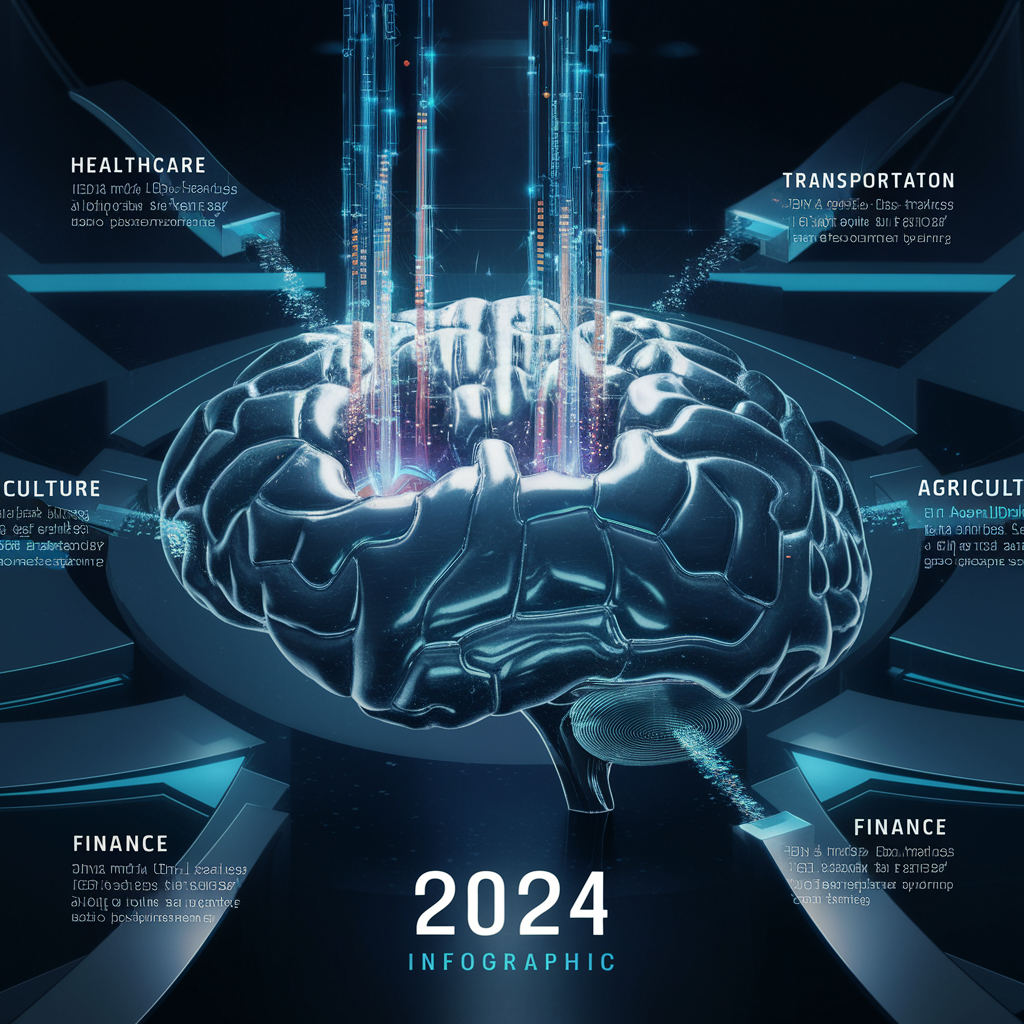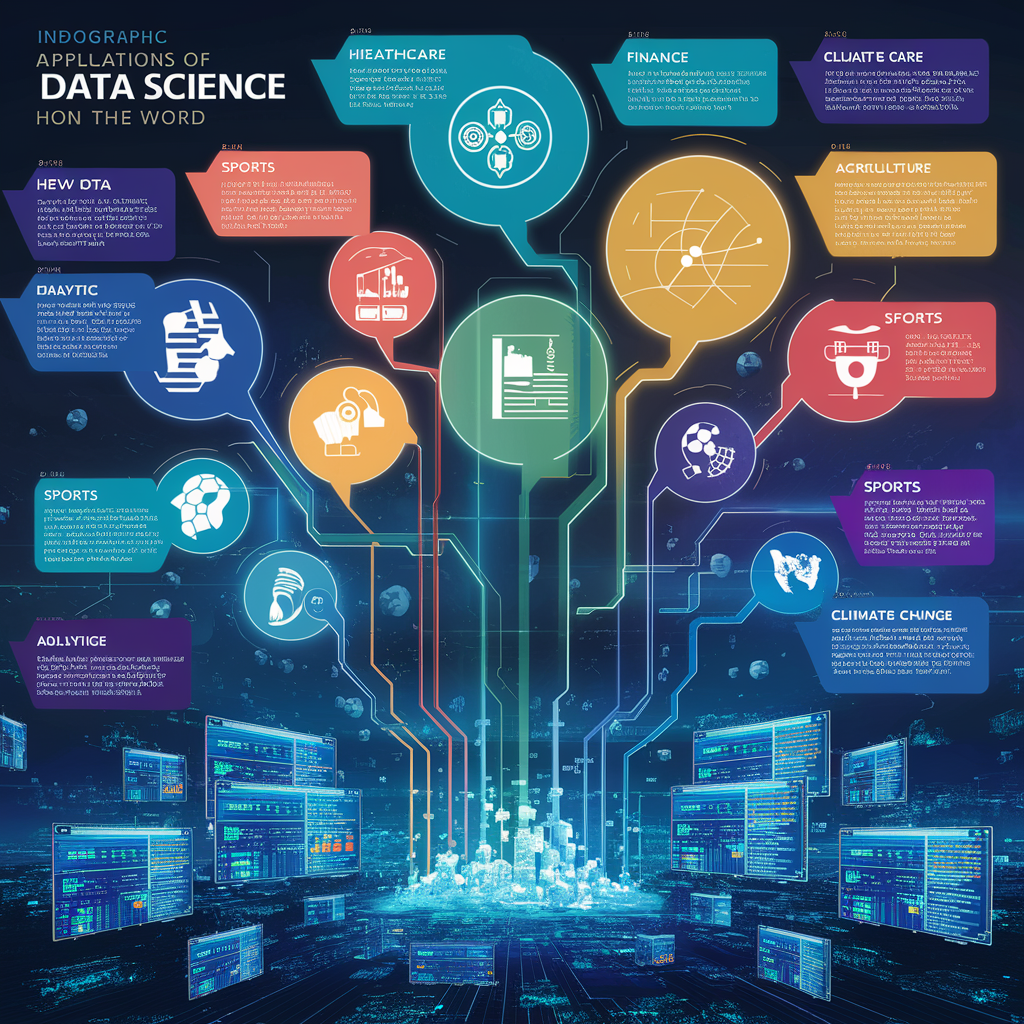Data science has become a cornerstone of innovation across numerous industries. By leveraging advanced analytics, machine learning, and artificial intelligence, businesses are transforming their operations and enhancing their decision-making processes. This article explores how data science is revolutionizing various industries in 2024.
Introduction to Data Science

Data science combines statistics, computer science, and domain expertise to extract insights from data. It involves processes such as data collection, cleaning, analysis, and visualization. The goal is to turn raw data into valuable information that can drive strategic decisions.
Data Science in Healthcare
Data science is making significant strides in healthcare by improving patient outcomes and operational efficiency. Applications include:
Applications of Data Science in Healthcare
| Application | Description | Benefit |
| Predictive Analytics | Forecasting patient admissions and disease outbreaks | Better resource allocation |
| Personalized Medicine | Customizing treatments based on patient data | Improved patient outcomes |
| Operational Efficiency | Streamlining administrative processes and reducing wait times | Enhanced patient experience |
Data Science in Finance
In the finance sector, data science helps manage risks, detect fraud, and provide personalized financial services. Key applications include:
- Fraud Detection: Identifying and preventing fraudulent transactions.
- Risk Management: Analyzing market trends and economic indicators to manage financial risk.
- Customer Insights: Understanding customer behavior to offer tailored financial products.
Data Science in Retail
Retailers use data science to enhance customer experiences, optimize inventory, and boost sales. Important uses are:
- Customer Segmentation: Grouping customers based on purchasing behavior.
- Inventory Management: Predicting stock needs to avoid overstock or stockouts.
- Sales Forecasting: Analyzing trends to predict future sales and plan marketing strategies.
Data Science in Manufacturing

Manufacturing is being transformed through data science by improving production processes and product quality. Applications include:
- Predictive Maintenance: Anticipating equipment failures to prevent downtime.
- Quality Control: Using data to monitor and improve product quality.
- Supply Chain Optimization: Enhancing supply chain efficiency through data-driven insights.
Data Science in Transportation
Transportation systems are becoming smarter and more efficient with data science. Applications include:
- Route Optimization: Using data to find the most efficient routes.
- Predictive Maintenance: Preventing vehicle breakdowns through data analysis.
- Traffic Management: Reducing congestion with real-time traffic data.
Data Science in Education
Education benefits from data science by personalizing learning and improving administrative processes. Key applications include:
| Application | Description | Benefit |
| Adaptive Learning | Customizes educational content to meet individual student needs | Personalized learning experiences |
| Student Performance Analysis | Tracks and predicts student performance to provide timely interventions | Improved student outcomes and targeted support |
| Resource Allocation | Optimizes the use of educational resources based on data insights | Efficient use of resources and cost savings |
| Curriculum Development | Uses data to develop and refine curriculum based on student performance and feedback | Enhanced curriculum tailored to student needs |
| Administrative Efficiency | Streamlines administrative processes such as enrollment, scheduling, and staffing | Improved operational efficiency |
| Predictive Analytics | Identifies students at risk of dropping out or failing and suggests interventions | Increased student retention and success rates |
| Learning Analytics | Analyzes data from learning management systems to understand learning patterns | Enhanced understanding of student learning behaviors |
| Feedback and Assessment | Provides data-driven feedback and assessment tools for teachers and students | More accurate and actionable feedback |
| Parental Engagement | Uses data to keep parents informed about their child’s progress and areas needing improvement | Increased parental involvement and support |
| Virtual Learning Environments | Analyzes data from online learning platforms to improve virtual learning experiences | Enhanced quality and effectiveness of online education |
Data Science in Marketing
Marketing strategies are becoming more targeted and effective thanks to data science. Applications include:
- Customer Insights: Analyzing data to understand customer preferences and behaviors.
- Campaign Optimization: Using data to fine-tune marketing campaigns for better results.
- Sentiment Analysis: Monitoring social media and customer reviews to gauge brand sentiment.
Applications of Data Science

Retail Industry
Data science helps retailers understand customer preferences, optimize inventory, and increase sales. Predictive analytics and personalized marketing strategies are key applications.
Internet Industry
Data science drives the internet industry by enhancing user experiences, personalizing content, and optimizing ad targeting. Machine learning algorithms analyze vast amounts of data to deliver relevant content.
Banking Industry
In banking, data science is used for risk management, fraud detection, and providing personalized banking experiences. It helps in making data-driven financial decisions and improving customer service.
Healthcare Industry
Data science revolutionizes healthcare by enabling predictive analytics, personalized medicine, and operational efficiency. It leads to better patient care and resource management.
Energy Industry
The energy sector uses data science for demand forecasting, optimizing energy distribution, and enhancing the efficiency of renewable energy sources. It helps in managing resources and reducing costs.
Automotive Industry
Data science in the automotive industry includes applications like predictive maintenance, autonomous driving, and enhancing customer experiences. It contributes to safer and more efficient transportation.
Telecommunications Industry
Telecommunications benefit from data science through network optimization, customer behavior analysis, and predictive maintenance. It helps in improving service quality and customer satisfaction.
Transportation Industry
Data science optimizes transportation systems by improving route planning, traffic management, and vehicle maintenance. It leads to more efficient and reliable transportation services.
Airline Industry
Airlines use data science for optimizing flight routes, managing schedules, and enhancing passenger experiences. It helps in reducing delays and improving operational efficiency.
Construction Industry
In construction, data science aids in project management, cost estimation, and risk analysis. It ensures timely completion of projects and efficient use of resources.
Transforming Data Science Industries
Healthcare
Data science transforms healthcare by providing predictive analytics, personalized treatments, and improving operational efficiency. It leads to better patient outcomes and resource management.
Finance
In finance, data science helps in risk management, fraud detection, and offering personalized financial services. It ensures better financial decisions and customer experiences.
Transportation
Transportation systems become more efficient with data science through route optimization, predictive maintenance, and traffic management. It enhances the overall efficiency and reliability of transportation services.
Education
Education benefits from data science through personalized learning, performance analysis, and resource optimization. It improves the quality of education and administrative efficiency.
Read More: Fran Candelera Biography and Net Worth
Conclusion
Data science is revolutionizing various industries in 2024 by providing valuable insights and enhancing decision-making processes. From healthcare and finance to retail and transportation, data science is driving innovation and transforming operations. As technology continues to evolve, the impact of data science will only grow, leading to even greater advancements across all sectors.
Frequently Asked Questions
Q1: How does data science improve student performance?
A: Data science improves student performance by tracking and analyzing individual progress, identifying areas where students need additional support, and providing personalized learning experiences. This helps educators tailor their teaching methods to meet the specific needs of each student.
Q2: What is adaptive learning, and how does it work?
A: Adaptive learning is an educational method that uses data to customize the learning experience for each student. By analyzing data on a student’s performance, learning style, and preferences, adaptive learning systems adjust the content, pace, and difficulty level to better suit the individual learner.
Q3: How can data science help in resource allocation in schools?
A: Data science helps in resource allocation by analyzing various factors such as student enrollment, attendance patterns, and usage of educational materials. This enables schools to allocate resources more efficiently, ensuring that materials, staff, and facilities are used optimally to enhance the learning environment.
Q4: What role does predictive analytics play in education?
A: Predictive analytics in education involves using data to forecast future student outcomes, such as academic performance or likelihood of dropping out. By identifying at-risk students early, schools can intervene with targeted support measures to improve their chances of success.
Q5: How can data science enhance parental engagement in education?
A: Data science enhances parental engagement by providing detailed insights into their child’s academic progress and areas needing improvement. This can be done through data-driven reports and dashboards that keep parents informed and involved in their child’s education, fostering a collaborative approach to learning.

Nicholas Clark is the innovative mind behind Insuranted.com, a website dedicated to providing clear, comprehensive, and reliable information on insurance. With a passion for simplifying complex topics, Nicholas aims to empower readers to make informed decisions about their insurance needs










